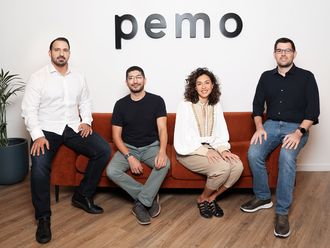
Dubai: The stakes have just gotten higher for Gulf entrepreneurs. A new ranking regime is being created — the Gulf 100 — which will showcase companies where the entrepreneurial light is shining brightest.
A similar ranking has already been created in Saudi Arabia and the new one will cover businesses in the other Gulf states.
"The GCC 100 is not [about] membership — it's a ranking of the fastest growing entrepreneur-led companies in the region," said Atif Abdul Malek, chief executive officer of Arcapita, the Bahrain-based financial institution closely involved in the process.
"The idea behind it is that [the provision of] a credible and well-backed platform to showcase the importance of entrepreneurial companies is a vital step towards attracting more capital and expertise into the region," he said.
"Companies which feature in the rankings — from Saudi Arabia, South Africa and Lebanon — have all reported a rise in interest and other positive dividends as a direct result," Abdul Malek added.
"Arcapita's aim is to support an initiative that we believe will help the GCC to develop a more entrepreneurial culture, which is necessary to prepare for the more developed economies in the future."
So, what do businesses need to have to make it to the final rankings — beyond that of being an entrepreneur-owned enterprise?
According to the promoters, the platform is open to any company that is privately owned with ten or more full-time employees as of end-2010. It should have an operating history of three years or more, and sales should be in the region of $100,000 (Dh367,300) in 2008 and $500,000 as of last year. Franchisee operations as well as government-funded private companies are excluded from the rankings.
"In this region, for early-stage growth companies, capital is often more easily accessible from informal networks of families and contacts than it is elsewhere in the world," Abdul Malek said.
"Probably the biggest challenge is the training of human capital to compete with the highly competitive markets elsewhere around the world, as well as the relative lack of experience available outside the core industries supported by the oil and gas infrastructure."
Much has been said in the recent past of private equity starting to chase possibilities in the private enterprise space. But, going by actual evidence, as of now it's proven to be more of a sentiment than actual practice.
Abdul Malek explains why.
"Private equity as an asset class targets growth capital investments in established companies," he said.
"Typically, entrepreneurs aiming to fund early-stage ventures look to bank finance, venture capital investment or angel investors to secure capital."
Supporting development
Would his bank itself get into the scene at some stage?
"The bank invests in developed companies all over the world; our interest in the GCC 100 is in supporting the development of a more dynamic entrepreneurial environment throughout the region, thereby helping to create the conditions that will one day produce the kinds of companies that Arcapita would like to invest in."
While not in the investment banking space, Arcapita invests on a deal-by-deal basis in private equity, real estate and infrastructure transactions around the world, Abdul Malek said.
These are then syndicated among its pool of investors, many of which are based in the GCC.
"We are beginning to add funds alongside our deal-by-deal model to allow us to attract more of the large institutional pools of capital in the region," he added.
Is a stock market listing the eventual destination that the GCC's privately owned powerhouses should aspire to?
Some of the individual Gulf states are already preparing the groundwork for such a transition. Abdul Malek would not be drawn into the debate. His response: "It entirely depends on the circumstances of the individual case."
Part of wider network
The Gulf 100 is part of the AllWorld Network, set up in 2007 by Deirdre Coyle, Anne Habiby and Harvard Business School's Michael Porter. The stated aim was to find the growth entrepreneurs in the emerging economies, and thus create an information system and network.
The AllWorld network has already compiled country rankings for Saudi Arabia, South Africa, India, Lebanon, Jordan and Turkey. The GCC 100 intends to encourage entrepreneurs from the other five Gulf states.












